#and his deep adoration for and faith in his sister which did ultimately win out when she was proven right and also saved him
Explore tagged Tumblr posts
Text
Enola Holmes: A Not So Elementary Adaptation

It's cliché and a bit unfair to say that the book was better than the film, but I'm afraid that's precisely where I need to start. Nancy Springer's Enola Holmes: The Case of the Missing Marquess is leagues better than Netflix's adaptation of it. They did her work dirty and to say that I'm shocked at the accolades other reviewers are heaping on the film is an understatement. Before I dive into any critiques though, it's worth acknowledging that not every minute of the two hour film was painful to get through. So what worked in Enola Holmes?
The film is carried by the talent of its cast, Millie Bobby Brown being the obvious heavy-hitter. She helps breathe life into a pretty terrible script and it's only a shame her talent is wasted on such a subpar character.
The idea to have Enola continually break the fourth wall, though edging into the realm of Dora the Explorer at times—"Do you have any ideas?"— was nevertheless a fun way to keep the audience looped into her thought process. Young viewers in particular might enjoy it as a way to make them feel like a part of the action and older viewers will note the Fleabag influence.
The cinematography is, perhaps, where most of my praise lies. The rapid cuts between past and present, rewinding as Enola thinks back to some pertinent detail, visualizing the cyphers with close ups on the letter tiles—all of it gave the film an upbeat, entertaining flair that almost made up for how bloated and meandering the plot was.
We got an equally upbeat soundtrack that helped to sell the action.
The overall experience was... fine. In the way a cobbled together, candy-coated, meant to be seen on a Friday night but we watched it Wednesday and then promptly forgot about it film is fine. I doubt Enola Holmes will be winning any awards, but it was a decently entertaining romp and really, does a Netflix film need to be anything more? If Enola was her own thing made entirely by Netflix's hands I wouldn't be writing this review. As it stands though, Enola is both an adaptation and the latest addition to one of the world’s most popular franchises. That's where the film fails: not as a fun diversion to take your mind off Covid-19, but as an adaptation of Springer's work and as a Sherlock Holmes story.
In short, Enola Holmes, though pretty to look at and entertaining in a predictable manner, still fails in five crucial areas:
1. Mycroft is Now a Mustache-Twirling Villain and Sherlock is No Longer Sherlock Holmes
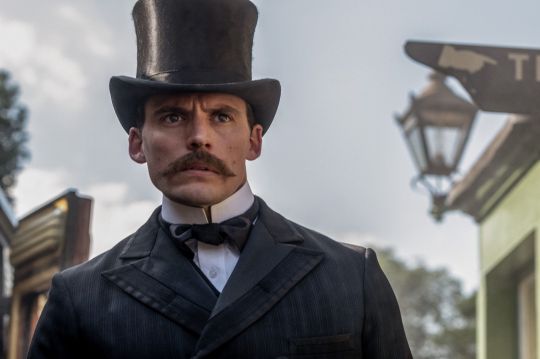
This aspect is the least egregious because admittedly the film didn't pull this version of Mycroft out of thin air. As the head of the household he is indeed Enola's primary antagonist (outside of some kidnappers) and though he insists that he's doing all this for Enola's own good, he does get downright cruel at times:
He rolled his eyes. “Just like her mother,�� he declared to the ceiling, and then he fixed upon me a stare so martyred, so condescending, that I froze rigid. In tones of sweetest reason he told me, “Enola, legally I hold complete charge over both your mother and you. I can, if I wish, lock you in your room until you become sensible, or take whatever other measures are necessary in order to achieve that desired result... You will do as I say" (Springer 69).
Mycroft's part is clear. He's the white, rich, powerful, able-bodied man who benefits from society's structure and thus would never think to change it. He does legally have charge over both Enola and Eudoria. He can do whatever he pleases to make them "sensible"... and that right there is the horror of it. Mycroft is a law-abiding man whose antagonism stems from doing precisely what he's allowed to do in a broken world. There are certainly elements of this in the Netflix adaptation, but that antagonism becomes so exaggerated that it's nearly laughable. Enola's governess (appointed by Mycroft) slaps her across the face the moment she speaks up. Mycroft screams at her in a carriage until she's cowering against the window. He takes her and throws her into a boarding school where everything is bleak and all the women dutifully follow instructions like hypnotized dolls. Enola Holmes ensures that we've lost all of Springer's nuance, notably the criticism of otherwise decent people who fall into the trap of doing the "right" (read: expected) thing. Despite her desire for freedom, in the novel Enola quickly realizes that she is not immune to society's standards:
"I thought he was younger.” Much younger, in his curled tresses and storybook suit. Twelve! Why, the boy should be wearing a sturdy woollen jacket and knickers, an Eton collar with a tie, and a decent manly haircut—
Thoughts, I realised, all too similar to those of my brother Sherlock upon meeting me (113-14).
She is precisely like her brothers, judging a boy for not looking and acting enough like a man just as they judged her for not looking and acting enough like a lady. The difference is that Enola has chaffed enough against those expectations to realize when she's falling prey to them, but the sympathetic link to her brothers remains. In the film, however, the conflict is no longer driven by fallible people doing what they think is best. Rather, it's made clear (in no uncertain terms) that these are just objectively bad people. Only villains hit someone like that. Only villains will scream at the top of their lungs until a young girl cries. Only villains roll their eyes at women's rights (a subplot that never existed in the novel). Springer writes Mycroft as a person, Netflix writes him as a cartoon, and the result is the loss of a nuanced message about what it means to enact change in a complicated world.��
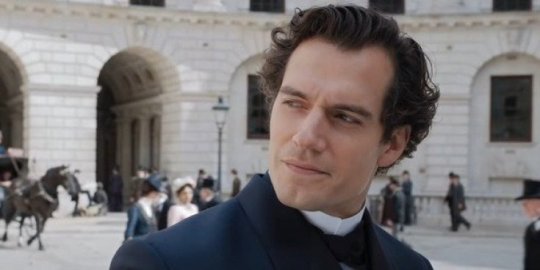
Which leaves us with Sherlock. Note that in the above passage he is the one who casts harsh judgement on Enola's outfit. Originally Mycroft took an interest in making Enola "sensible" and Sherlock— in true Holmes fashion—straddles a fine line between comfort and insult:
"Mycroft,” Sherlock intervened, “the girl's head, you'll observe, is rather small in proportion to her remarkably tall body. Let her alone. There is no use confusing and upsetting her when you'll find out for yourself soon enough'" (38).
***
"Could mean that she left impulsively and in haste, or it could reflect the innate untidiness of a woman's mind,” interrupted Sherlock. “Of what use is reason when it comes to the dealings of a woman, and very likely one in her dotage?" (43).
A large part of Enola's drive stems from proving to Sherlock, the world, and even herself that a small head does not mean lack of intelligence. His insults, couched in a misguided attempt to sooth, is what makes Sherlock a complex character and his broader sexism is what makes him a flawed character, not Superman in a tweed suit. Yet in the film Mycroft becomes the villain and Sherlock is his good brother foil. Rather than needing to acknowledge that Enola has a knack for deduction by reading the excellent questions she's asked about the case—because why give your characters any development?—he already adores and has complete faith in her, laughing that he too likes to draw caricatures to think. By the tree Sherlock remanences fondly about Enola's childhood where she demonstrated appropriately quirky preferences for a genius, things like not wearing trousers and keeping a pinecone for a pet. They have a clear connection that Mycroft could never understand, one based both in deduction and, it seems, being a halfway decent human being. We are told that Enola has Sherlock's wits, but poor Mycroft lucked out, despite the fact that up until this point the film has done nothing to demonstrate this supposed intelligence. (To say nothing of how canonically Mycroft's intellect rivals his brother's.) Enola falls to her knees and begs for Sherlock's help, saying that "For [Mycroft] I'm a nuisance, to you—" implying that they have a deep bond despite not having seen one another since Enola was a toddler. Indeed, at one point Enola challenges Lestrade to a Sherlock quiz filled with information presumably not found in the newspaper clippings she's saved of him, which begs the question of how she knows her brother so well when she hasn't seen him in a decade and he, in turn, walked right by her with no recognition. Truthfully, Lestrade should know Sherlock better. Through all this the sibling bond is used as a heavy-handed insistence that Enola is Sherlock's protégé, him leaving her with the advice that "Those kinds of mysteries are always the best to unpick” and straight up asking at one point if she’s solved the case. The plot has Enola gearing up to outwit her genius brother, which did not happen in the novel and is precisely why I loved it. Enola isn't out to be a master of deduction in her teens, she's a finder of lost people who uses a similar, but ultimately unique set of skills. She does things Sherlock can't because she is isn't Sherlock. They're not in competition, they're peers, yet the film fails to understand that, using Sherlock's good brother bonding to emphasize Enola's place as his protégé turned superior. He exists, peppered throughout the film, so that she can surpass him in the end.
You know what happens in the novel? Sherlock walks away from her, dismissive, and that's that.
That's also Sherlock Holmes. I won't bore you with complaints about Cavill being too handsome and Claflin being too thin for their respective parts, but I will draw the line at complete character assassination. Part of Sherlock's charm is that he's far more compassionate than he first appears, but that doesn't mean he would, at the drop of a telegram, become a doting older brother to a sister of all things. Despite the absurdity of the Doyle Estate's lawsuit against Netflix for making Sherlock an emotional man who respects women... they're right that this isn't their character. Oh, Sherlock is emotive, but it's in the form of excited exclamations over clues, or the occasional warm word towards Watson—someone he has known and lived with for many years. Sherlock respects women, though it's through those societal expectations. He'll offer them a seat, an ear, a handkerchief if they need one, and always the promise of help, but he then dismisses them with, "The fairer sex is your department, Watson." Springer successfully wrote Sherlock Holmes with a little sister, a man who will bark out a laugh at her caricature but still leave her to Mycroft's whims because he has his own life to tend to. This is a man who insists that the mind of a woman is inscrutable and thus must grapple with his shock at Enola's ability to cover the "salient points" of the case (58). Cavill's Sherlock is no Sherlock at all and though there's nothing wrong with updating a character for a modern audience (see: Elementary), I do question why Netflix strayed so far from Springer's work. The novel is, after all, their blueprint. She already managed the difficult task of writing an in-character Sherlock Holmes who remains approachable to both a modern audience and Enola herself, yet for some reason Netflix tossed that work aside.
2. Enola is "Special,” Not At All Like Other Girls
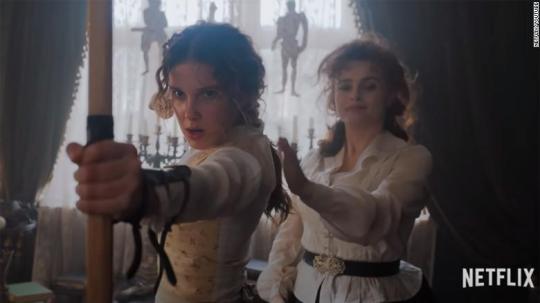
Allow me to paint you a picture. Enola Holmes is an empathetic, fourteen-year-old girl who, while bright, does not possess an intelligence worthy of note. No one is gasping as she deduces seemingly impossible things from the age of four, or admiring her knowledge of some obscure, appropriately impressive topic. Rather, Enola is a fairly normal girl with an abnormal upbringing, characterized by her patience and willingness to work. Deciphering the many hiding places where her mother stashed cash takes her weeks, requiring that Enola work through the night in secrecy while maintaining appearances during the day. She manages to hatch a plan of escape that demonstrates the thought she's put into it without testing the reader's suspension of disbelief. More than that, she uses the feminine tools at her disposal to give herself an edge: hiding her face behind a widow's veil and storing luggage in the bustle of her dress. Upon achieving freedom, her understanding of another lonely boy leads her to try and help him, resulting in a dangerous kidnapping wherein Enola acts as most fourteen-year-olds would, scared out of her mind with a few moments of bravery born of pure survival instinct. She and Tewksbury escape together, as friends, before Enola sets out on becoming the first scientific perditorian, a finder of lost people.
Sadly, this new Enola shares little resemblance with her novel counterpart. What Netflix seemingly fails to understand is that giving a character flaws makes them relatable and that someone who looks more like us is someone we can connect with. This Enola, simply put, is extraordinary. She's read all the books in the library, knows science, tennis, painting, archery, and a deadly form of Jujitsu (more on that below). In the novel Enola bemoans that she was never particularly good at cyphers and now must improve if she has any hope of reading what her mother left her. In the film she simply knows the answers, near instantaneously. Enola masters her travels, her disguises, and her deductions, all with barely a hitch. Though Enola doesn't have impressive detective skills yet, her memory is apparently photographic, allowing her to look back on a single glance into a room, years ago, and untangle precisely what her mother was planning. It's a BBC Sherlock-esque form of 'deduction' wherein there's no real thought involved, just an innate ability to recall a newspaper across the room with perfect clarity. The one thing Enola can't do well is ride a bike which, considering that in the novel she quite enjoys the activity, feels like a tacked on "flaw" that the film never has to have her grapple with.
More than simply expanding upon her skillset—because let’s be real, it’s not like Sherlock himself doesn’t have an impressive list of accomplishments. Even if Enola’s feelings of inadequacy are part of the point Springer was working to make—the film changes the core of her personality. I cannot stress enough that Enola is a sheltered fourteen-year-old who is devastated by the disappearance of her mother and terrified by the new world she's entered. That fear, uncertainty, and the numerous mistakes that come out of it is what allowed me to connect with Enola and go, "Yeah. I can see myself in her." Meanwhile, this new Enola is overwhelmingly confident, to the point where I felt like I was watching a child's fantasy of a strong woman rather than one who actually demonstrates strength by overcoming challenges. For example, contrast her meeting with Sherlock and Mycroft on the train platform with what we got in the film:
"And to my annoyance, I found myself trembling as I hopped off my bicycle. A strip of lace from my pantalets, confounded flimsy things, caught on the chain, tore loose, and dangled over my left boot.
Trying to tuck it up, I dropped my shawl.
This would not do. Taking a deep breath, leaving my shawl on my bicycle and my bicycle leaning against the station wall, I straightened and approached the two Londoners, not quite succeeding in holding my head high" (31-32).
***
"Well, if they did not desire the pleasure of my conversation, it was a good thing, as I stood mute and stupid... 'I don't know where she's gone,' I said, and to my own surprise—for I had not wept until that moment—I burst into tears" (34).
I'd ask where this frightened, fumbling Enola has gone, but it's clear that she never existed in the script to begin with. The film is chock-full of her being, to be frank, a badass. She gleefully beats up the bad guys in perfect form, no, "I froze, cowering, like a rabbit in a thicket" (164). This Enola always gets the last word in and never falters in her confident demeanor, no, "I wish I could say I swept with cold dignity out of the room, but the truth is, I tripped over my skirt and stumbled up the stairs" (70). Enola is the one, special girl in an entire school who can see how rigid and horrible these social expectations are, straining against them while all her lesser peers roll their eyes. That's how she's characterized: as "special," right from the get-go, and that eliminates any growth she might have experienced over the course of the film. More than that, it feels like a slap in the face to Springer's otherwise likeable, well-rounded character.
3. A Focus on Hollywood Action and Those Strong Female Characters
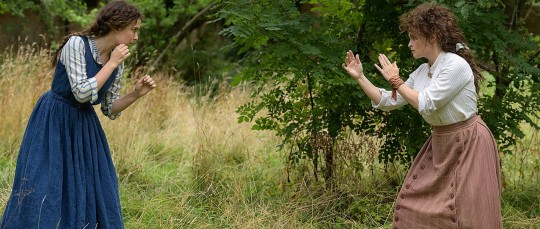
It never fails to amaze me how often Sherlock Holmes adaptations fail to remember that he is, at his core, an intellectual. Sure, there's the occasional story where Sherlock puts his boxing or singlestick skills to good use, and he did survive his encounter with Moriarty thanks to his own martial arts, but these moments are rarities across the canon. Pick up any Sherlock Holmes story, open to a random page, and you will find him sitting fireside to mule over a case, donning a disguise to observe the suspects, or combing through his many papers to find that one, necessary scrap of information. Sherlock Holmes is about deduction, a series of observations and conclusions based on logic. He's not an action hero. Nor is Enola, yet Netflix seems to be under the impression that no audience can survive a two hour film without something exploding.
I'd like to present a concise list of things that happened in the film that were, in my opinion, unnecessary:
Enola and Tewksbury throw themselves out of a moving train to miraculously land unharmed on the grass below.
Enola uses the science knowledge her mother gave her to ignite a whole room of gunpowder and explosives, resulting in a spectacle that somehow doesn't kill her pursuer.
Enola engages in a long shootout with her attacker, Tewksbury takes a shot straight to the chest, but survives because of a breastplate he only had a few seconds to put on and hide beneath his shirt. Then Enola succeeds in killing Burn Gorman's slimy character.
Enola beats up her attackers many, many times.
This right here is the worst change to her character. Enola is, plainly put, a "strong woman." Literally. She was trained from a young age to kick ass and now that's precisely what she'll do. Gone is the unprepared but brave girl who heads out onto the dangerous London streets in the hope of helping her mother and a young boy. What does this Enola have to fear? There's only one martial arts move she hasn't mastered yet and, don't worry, she gets it by the end of the film. Enola suffers from the Hollywood belief that strong women are defined solely as physically capable women and though there's nothing wrong with that on the surface, the archetype has become so prevalent that any deviation is seen as too weak—too princess-y—to be considered feminist. If you're not kicking ass and taking names then you can only be passive, right? Stuck in a tower somewhere and awaiting your prince. But what about me? I have no ability to flip someone over my shoulder and throw them into a wall. What about pacifists? What about the disabled? By continually claiming that this is what a "strong" woman looks like you eliminate a huge number of women from this pool. The women we are meant to uphold in this film—Enola, her Mother, and her Mother's friend from the teahouse—are all fighters of the physical variety, whereas the bad women like Mrs. Harris and her pupils are too cultured for self-defense. They're too feminine to be feminist. But feminism isn't about your ability to throw a punch. Enola's success now derives from being the most talented and the most violent in the room, rather than the most determined, smart, and empathetic. She threatens people and lunges at them, reminding others that she's perfectly capable of tying up a guy is she so chooses because "I know Jujitsu." Enola possesses a power that is just as fantastical as kissing a frog into a prince. In sixteen short years she has achieved what no real life woman ever will: the ability to go wherever she pleases and do whatever she wants without the threat of violence. Because Enola is the violence. While her attacker is attempting to drown her with somewhat horrific realism, Enola takes the time to wink at the audience before rearing back and bloodying his nose. After all, why would you think she was in any danger? Masters of Jujitsu with an uncanny ability to dodge bullets don't have anything to fear... unlike every woman watching this film.

It's certainly some kind of wish fulfillment, a fantasy to indulge in, but I personally preferred the original Enola who never had any Hollywood skills at her disposal yet still managed to come out on top. That's a character I can see myself in and want to see myself in given that the concept of non-violent strength is continually pushed to the wayside. Not to mention... that's a Sherlock Holmes story. Coming out on top through intellect and bravery alone is the entire point of the genre, so why Netflix felt the need to turn Enola into an action hero is beyond me.
4. Aging Up the Protagonists (and Giving Them an Eye-Rolling Romance)
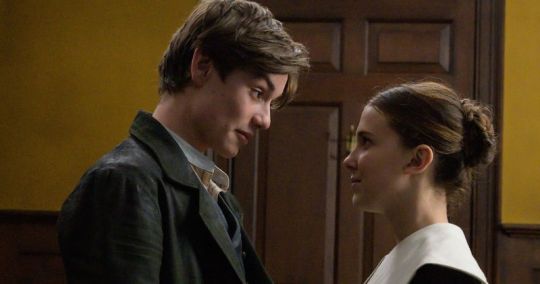
The choice to age up our heroes is, arguably, the worst decision here. In the original novel Enola has just turned fourteen and Tewksbury is a child, twelve-years-old, though he looks even younger. It's a story for a younger audience staring appropriately young heroes, with the protagonists' status as children crucial to one of the overarching themes of the story: what does it really mean to strike out on your own and when are you ready for it? Adding two years to Enola's age is something I'm perfectly fine with. After all, the difference between fourteen and sixteen isn't that great and Brown herself is sixteen until February of 2021, so why not aim for realism and make her character the same? That's all reasonable and this is, indeed, an adaptation. No need to adhere to every detail of the text. What puzzles me though is why in the world they would take a terrified, sassy, compassionate twelve-year-old and turn him into a bumbling seventeen-year-old instead?
Ah yes. The romance.
In the same way that I fail to understand the assumption that a film needs over-the-top action to be entertaining, I likewise fail to understand the assumption that it needs a romance—and a heterosexual one to boot. There's something incredibly discomforting in watching a film that so loudly proclaim itself as feminist, yet it takes the strong friendship between two children and turns it into an incredibly awkward, hetero True Love story. Remember when Enola loudly proclaims that she doesn't want a husband? The film didn't, because an hour later she's stroking her hand over Tewksbury's while twirling her hair. Which isn't to say that women can't fall in love, or change their minds, just that it's disheartening to see a supposedly feminist film so completely fall into one of the biggest expectations for women, even today. Forget Enola running up to men and paying them for their clothes as an expression of freedom, is anyone going to acknowledge that narratively she’s still stuck living the life the men around her want? Find yourself a husband, Enola. The heavy implication is she did, just with Jujitsu rather than embroidery. Different method, same message, and that’s incredibly frustrating when this didn’t exist in the original story. “It's about freedom!” the film insists. So why didn't you give Enola the freedom to have a platonic adventure?
It's not even a good romance. Rather painful, really. When Tewksbury, after meeting her just once before, passionately says "I don't want to leave you, Enola" because her company is apparently more important than him staying alive, I literally laughed out loud. It's ridiculous and it's ridiculously precisely because it was shoe-horned into a story that didn't need it. More than simply saddling Enola with a bland love interest though, this leads to a number of unfortunate changes in the story's plot, both unnecessary additions and disappointing exclusions. Enola no longer meets Tewksbury after they've both been kidnapped (him for ransom and her for snooping into his case), but rather watches him cut himself out of a carpetbag on the train. I hope I don't have to explain which of these scenarios is more likely and, thus, more satisfying. Meeting Tewksbury on the train means that Enola gets to have a nighttime chat with him about precisely why he ran away. Thus, when she goes to his estate she no longer needs to deduce his hiding spot based on her own desires to have a place of her own, she just needs to recall that a very big branch nearly fell on him and behold, there that branch is. (The fact that the branch is a would-be murder weapon makes its convenient placement all the more eye-rolling.) Rather than involving herself in the case out of empathy for the family, Enola loudly proclaims that she wants nothing to do with Tewksbury and only reluctantly gets involved when it's clear his life is on the line. And that right there is another issue. In the novel there is no murderous plot in an attempt to keep reform bills from passing. Tewksbury is a child who, like Enola, ran away and quickly discovers that life with an overbearing mother isn't so bad when you've experienced London's dangerous streets. That's the emotional blow: Enola has no mother to go home to anymore and must press out onto those streets whether she's ready for it or not.
Perhaps the only redeeming change is giving Tewksbury an interest in flowers instead of ships. Regardless of how overly simplistic the feminist message is, it is a nice touch to give the guy a traditionally feminine hobby while Enola sharpens her knife. The fact that Enola learned that from her mother and Tewksbury learned botany from his father feels like a nudge at a far better film than Enola Holmes managed to be. For every shining moment of insight—the constraints of gendered hobbies, a black working class woman informing Sherlock that he can never understand what it means to lack power—the film gives us twenty minutes worth of frustrating stupidity. Such as how Enola doesn't seem to conceive of escaping from boarding school until Tewksbury appears to rescue her. She then proceeds to get carried around in a basket for a few minutes before going out the window... which she could have done on her own at any point, locked doors or no. But it seems that narrative consistency isn't worth more than Enola (somehow) leaving a caricature of Mrs. Harris and Mycroft behind. The film is clearly trying to promote a "Rah, rah, go, women, go!" message, but fails to understand that having Enola find a way out of the school herself would be more emotionally fulfilling than having her send a generic 'You're mean' message after the two men in her life—Sherlock and Tewksbury—remind her that she can, in fact, take action.
Which brings me to my biggest criticism and what I would argue is the film's greatest flaw. Reviewers and fans alike are hailing Enola Holmes as a feminist masterpiece and yes, to a certain extent it is. Feminist, that is, not a masterpiece. (5) But it's a hollow feminism. A fantasy feminism. A simple, exaggerated feminism that came out of a Feminism 101 PowerPoint. To quote Sherlock, let's review the salient points:
A woman cannot be the star of her own film without having a male love interest, even if this goes against everything the original novel stood for.
A feminist woman cannot also be selfish. Instead she must have a selfless drive to change the world with bombs.
The best kind of women are those who reject femininity as much as they can. They will wear boy's clothes whenever possible and snub their nose at something as useless as embroidery. Any woman who enjoys such skills or desires to become lady-like just hasn't realized the sort of prison she's in yet.
The best women also embody other masculine traits, like being able to take down men twice their size. Passive women will titter behind their hands. Active women will kick you in the balls. If you really want to be a strong woman, learn how to throw a decent punch.
Women are, above all, superior to men.
Yes, yes, I joke about it just as much as the next woman, but seeing it played fairly straight was a bit of an uncomfortable experience, even more-so during a gender revolution where stories like this leave trans, nonbinary, and genderqueer viewers out of the ideological loop. Enola goes on and on about what a "useless boy" Tewksbury is (though of course she must still be attracted to him) and her mother's teachings are filled with lessons about not listening to men. As established, Mycroft—and Lestrade—are the simplistically evil men Enola must circumvent, whereas Sherlock exists for her to gain victory over: "How did your sister get there first?" Enola supposedly has a strength that Tewksbury lacks— he's just "foolish"—and she shouts out such cringe-worthy lines as, "You're a man when I tell you you're a man!"
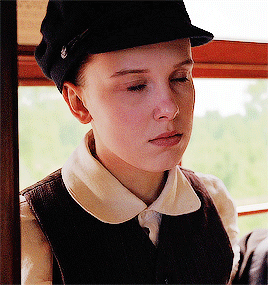
I get the message, I really do. As a teenager I probably would have loved it, but now I have to ask: aren't we past the image of men-hating feminists? Granted, the film never goes quite that far, but it gets close. We’ve got one woman who is ready to start blowing things up to achieve equality and another who revels in looking down on the men in her life. That’s been the framing for years, that feminists are cruel, dangerous people and Tewksbury making heart-eyes at Enola doesn’t instantly fix the echoes of that. There's a certain amount of justification for both characterizations—we have reached points in history where peaceful protests are no longer enough and Tewksbury is indeed a fool at times—but that nuance is entirely lost among the film's overall message of "Women rule, men drool." It feels like there’s a smart film hidden somewhere between the grandmother murdering to keep the status quo and Enola’s mother bombing for change, that balance existing in Enola herself who does the most for women by protecting Tewkesbury... but Enola Holmes is too busy juggling all the different films it wants to be to really hit on that message. It certainly doesn’t have time to say anything worthwhile about the fight it’s using as a backdrop. Enola gasps that "Mycroft is right. You are dangerous" when she finds her mother's bombs, but does she ever grapple with whether she supports violence on a large scale in the name of creating a better world? Does she work through this sudden revelation that she agrees with Mycroft about something crucial? Of course not. Enola just hugs her mom, asks Sherlock not to go after her, and the film leaves it at that.
The takeaway is less one of empowerment and more, ironically, of restriction. You can fight, but only via bombs and punches. It's okay to be a woman, provided you don't like too many feminine things. You can save the day, so long as there's a man at your side poised to marry you in the future. I felt like I was watching a pre-2000s script where "equality" means embracing the idea that you're "not like other girls" so that men will finally take you seriously. Because then you don't really feel like a woman to them anymore, do you? You're a martial arts loving, trouser-wearing, loud and brilliant individual who just happens to have long hair. You’re unique and, therefore, worthy of attention, unlike all those other girls.

That's some women's experiences, but far from all, and crucially I don't think this is the woman that Springer wrote in her novel.
The Case of the Missing Marquess is a feminist book. It gives us a flawed, brave, intelligent woman who sets out to help people and achieves just that, mostly through her own strength, but also with some help from the young boy she befriends. Her brothers are privileged, misguided men who she nevertheless cares for deeply and her mother finally puts herself first, leaving Enola to go and live with the Romani people. Everyone in Springer's book feels human, the women especially. Enola gets to tremble her way through scary decisions while still remaining brave. Her mother gets to be selfish while still remaining loving. They're far more than just women blessed with extraordinary talents who will take what they want by force. Springer's women? They don't have that Hollywood glamour. They're pretty ordinary, actually, despite the surface quirks. They’re like us and thus they must make use of what tools they have in order to change their own situations as well as the world. The fact that they still succeed feels very feminist to me, far more-so than granting your character the ability to flip a man into the ground and calling it a day.
Know that I watched Enola Holmes with a friend over Netflix Party and the repeated comment from us both was, "I'd rather be watching The Great Mouse Detective." Enola Holmes is by no means a horrible film. It has beauty, comedy, and a whole lot of heart, but it could have been leagues better given its source material and the talent of its cast. It’s a film that tries to do too much without having a firm grasp of its own message and, as a result, becomes a film mostly about missed potential. Which leads me right back to where I began: The book is better. Go read the book.
Images
Enola Holmes
Mycroft Holmes
Sherlock Holmes
Enola and her Mother Doing Archery
Enola and her Mother Fighting
Tewkesbury and Enola
33 notes
·
View notes